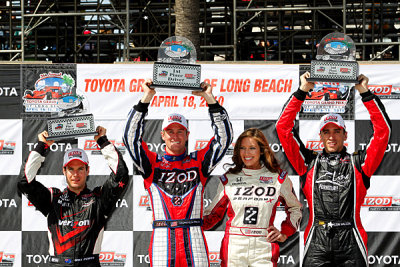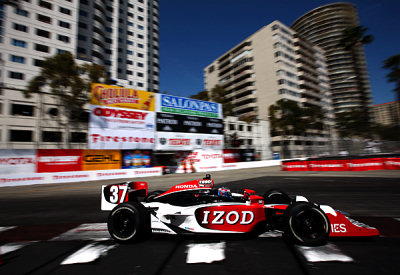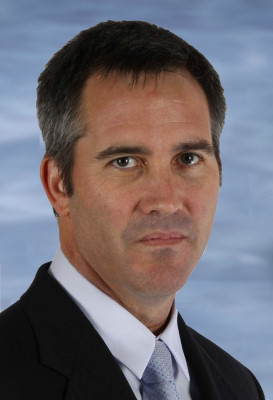The Way It Is/ Randy Bernard's vision
by Gordon Kirby It was great to see Ryan Hunter-Reay score a fine win at Long Beach. Ryan became the first American to win in Long Beach since team boss Michael Andretti won in 2002. Hunter-Reay also established himself as the first American to win an IndyCar race since he won at Watkins Glen in July of 2008 while driving for Bobby Rahal's team.
It was great to see Ryan Hunter-Reay score a fine win at Long Beach. Ryan became the first American to win in Long Beach since team boss Michael Andretti won in 2002. Hunter-Reay also established himself as the first American to win an IndyCar race since he won at Watkins Glen in July of 2008 while driving for Bobby Rahal's team.
Hunter-Reay's car is sponsored by IRL series sponsor Izod and Ryan and team owner Andretti hope his win in California will help seal an expanded deal with Izod to back Hunter-Reay for the full season. Right now, his sponsorship package extends only through the Texas IRL round in June. Hunter-Reay's plight is common to many IndyCar drivers and teams and the IRL's new CEO Randy Bernard is very aware that he must make dramatic improvements to the series much-reduced media coverage and commercial or sponsorship draw.
I talked with Bernard in Long Beach last weekend and was impressed with his open and inquisitive mind. Bernard is a highly-motivated man who is brimming with ideas, many of them 'outside the box'. I wish him the best of the luck in his new endeavor and hope he can bring some life and commercial blood to IndyCar racing over the next few years.
Bernard has been on the job for only seven weeks, since the beginning of March, but he's quickly put into place an eight-man committee to determine the IRL's new car and engine formula for 2012. The IRL has largely wasted the past two years dithering and spinning its wheels over this much-debated decision and Bernard has shown he's a man of action by establishing a means of determining the new rules. He insists te new formula will be determined by the middle of June.
"I look back at what we've done over the past two years with the OEM round tables and the surveys we've just recently started doing with the fans and I felt like that we didn't have a process that could determine the next car," Bernard explained. "Knowing my naivete about the sport I knew I was in no position to make this decision and in doing my due diligence I also felt that there were several issues that we were going to be confronted with. One of those was there was a level of distrust as to why one company would be chosen over another company. Was it about money or something else that might interfere with selecting the correct car?

© LAT USA
Bernard selected retired United States Air Force general William R. Looney III to mediate the committee.
"One of General Looney's last roles with the Air Force was as commander of modernizing the USAF's aircraft," Bernard said. "He brought a vision to the process and I think he brings the same thing to our sport as he did there, which is to bring safety and technology to the sport and develop a process of how to do that. I felt he could add some knowledge, expertise and credibility to the committee. He's not a voting decision maker. He's helping me with the process."
The committee members are IRL president of competition Brian Barnhart, retired former CART and Indy 500 winner Gil de Ferran, retired Ford racing executive Neil Ressler, former FIA technical consultant, Jaguar F1 team principal and founder of Pi Research Tony Purnell, veteran engine man Rick Long and former Champ Car and IRL official Tony Cotman who now runs NZR Consulting, a race circuit design and management company.
"The seven folks I've put on the committtee I think are very well-rounded," Bernard commented. "The first step is to give them as much information as possible about the past two years and what the OEM round tables had to say. I want to also give them as much fan demographic research that we have and I want the cost listed of every part on this new car. We want to set down a request for proposal that's very, very complete and gives direction on which way we're leaning.
"The other key questions this committee is going to have to decide are how important or relevant is this series if there's only one auto manufacturer involved? How important is sole-source versus open-source? How important is a lease versus ownership? On the technology side, we have to answer how can we create technology that fans are intrigued with? And on the competitive level, everybody loves how competitive it is right now and I think that's something that's very important to the equation as well."
Bernard says the committee will render a final decision by the middle of June.
"I would love to see a completed decision by June 15th," he remarked. "So there's a tremendous amount of work we have to do in a very short time."
Some people, most notably Roger Penske, would like to see the new formula moved back to 2013 and there's already talk of grandfathering the existing Dallara-Honda for a few years to enable the many cash-strapped teams to survive.
"I have an opinion but I don't think my opinion should be interjected at this point," Bernard said. "I want to really protect the integrity of the committee. They need to make the decision and if they come back to me and say we need to wait until 2013 we'll push it back. Their decision will be what we'll go with."
Bernard has been in contact with as many as thirty auto manufacturers to see what interest they have in building engines for the new IndyCar formula.
"I've been very impressed with the level of interest from different manufacturers," he commented. "I sent an email off to a significant number of manufacturers. I hope I hit all of them. I also sent certified letters out because I wanted to make sure everyone knows that we're doing as much as possible to really make sure that we're doing our due diligence before we start this process."

© LAT USA
"There are several key issues," he observed. "I think our television is going to be a very big issue. That's where we need to grow our fan base. If we grow our fan base on television we will grow our sponsorship and that will make everyboy in the paddock happy.
"I think we also have to do a better job of creating driver identity and at the competition level we have to make races that the fans want to watch with very compelling story lines. I think that's very important. This sport needs many more story lines than it currently has."
Bernard also talked about what attracted him to join the IRL.
"It's interesting," he grinned. "I had a sponsor summit in mid-December and there was a rumor that I was going to leave the PBR, which really wasn't true. I had a four-year contract and I sold sixty-five percent of it to PBR three years ago. So I could leave at any time after two months notice. When that rumor came out I went to the sponsor summit and said the rumor was fictitious. I said I was very happy where I'm at. And of course, three weeks after that I got a phone call asking if I would be interested in a consulting job."
Josie George had heard about Bernard's achievements in the Pro Bull Riding business and she wanted to talk to him about working as a consultant to the IRL.
"So I flew in and met with Josie George and Jeff Belksus," Bernard said. "They called me a back a few days later and asked if I would be interested in being CEO of the IRL. As I started doing my homework and learning more about the sport and seeing the opportunities that are out there it was very intriguing to me. So I asked them for two weeks more time to do my due diligence and I spent as much time as I could flying to meetings with folks in the industry so I could get a better indication of the whole picture.
"One of the most important things I could do was to make sure I would be accepted," Bernard added. "I didn't want to come into a sport where I wouldn't be accepted. I needed to make sure I had complete support from everyone involved. That was very important."
Bernard also took a close look at Izod's plans.

© Indy Racing League
Added Michael Andretti after Hunter-Reay's Long Beach victory:
"I think Izod is the best series sponsor you could ever want," Michael said. "What they're doing for the series is great and it's just going to explode over the next few months. I'm so excited about the future of IndyCar racing."
Bernard also said he would never have considered joining the IRL if the long IRL/CART civil war had continued.
"Another thing I felt was very important was reunification," he observed. "I would never have accepted or wanted this job if it was divided. It wouldn't make any sense. I also wanted to look in the board of director's eyes and make sure I had their commitment and that they were going to give me 110 percent support. I wanted to make sure they were going to stand behind me when I made decisions. And when all those things came together I thought it was a great opportunity."
Bernard listed the biggest challenges he faces in running the IRL.
"I think the best thing I bring to IndyCar racing right now is that I don't have politics on any side so it allows me to look at it from 40,000 feet from a completely different perspective," he remarked. "I think that some of the difficult challenges are number one, making sure that everyone is thinking outside the box and really trying to just push the limits.
"The key questions are: How do we create bigger and better stars? How do we make sure the tracks are selling-out or doing as much as possible to promote the race before it gets to town? I want to make sure we can answer those questions and that we have a consistent message from all of our promoters. With the Leaders' Circle contract we spend a significant amount of expense on the prize money, which we need. But I want to make sure we have a plan in place that we can grow that through our sanction agreements. We want the team owners to grow as the sport grows so there's a bond that everyone feels a part of this sport going forward.
"Since 1995 through today everyone saw this sport lose millions of fans," Bernard added. "Some of them went to NASCAR. But I think a lot of them became uninterested as their hero or legend retired or left the sport. So I think what we have to do is build stars and we have to start from the grass roots and karting has to be a very big part of this. We've got to make those kids at the local go kart tracks become our future stars of the next ten or fifteen years. That to me is very important."
Another important factor is making the ladder system work. This year, for example, Indy Lights champion J.R. Hildebrand is driving an LMPChallenge car in the ALMS series and Atlantic champion John Edwards and Star-Mazda champion Adam Christodoulou are sharing a Speed Source Mazda RX-8 GT car in the Grand-Am series. It's great that these young fellows have work but Hildebrand should have been promoted to an Indy car ride and Edwards and Christodoulou should be racing in the Indy Lights series, ideally with funding from a ladder system scholarship program.
"I think our ladder system has to have credibility," Bernard commented. "When I say that, I don't think it's fair that drivers can come into IndyCar racing without being part of our ladder program. If we're going to make the ladder program truly successful I think everyone should have to be some type of winner. If we're saying we have the best drivers in the world yet they can miss our ladder system, how do we know how good they are? I think building and integrating the ladder system into IndyCar racing is very important and we will be working very hard to make that happen."
Randy Bernard has many challenges on his plate but he appears to be relishing the demands on his time and intellect. Everyone in the sport hopes he will succeed.
Auto Racing ~ Gordon Kirby
Copyright 2010 ~ All Rights Reserved
Copyright 2010 ~ All Rights Reserved
Top of Page